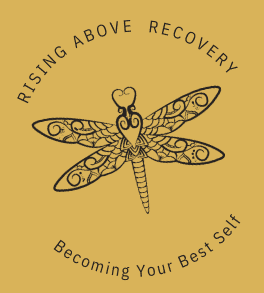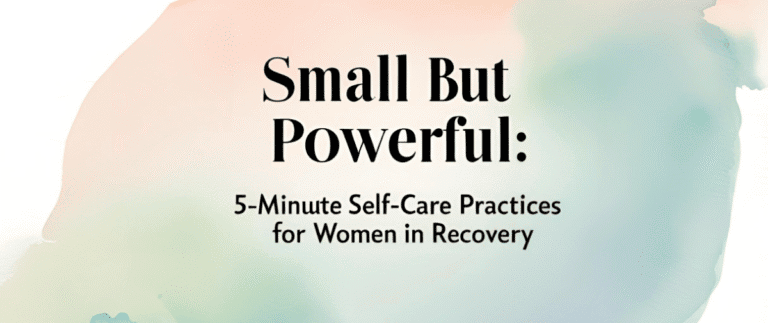Recovery from addiction is a journey of healing, self-discovery, and transformation. For women in early recovery, self-care is not just a luxury but a vital tool that helps rebuild the mind, body, and spirit.
Prioritizing self-care can mean the difference between struggling through recovery and thriving. In this post, we’ll explore why self-care is essential in recovery, how it supports the healing process and practical ways to incorporate self-care into daily life.

Why Self-Care is Essential in Recovery
Addiction often leads to a cycle of self-neglect. Whether it’s poor nutrition, lack of sleep, or emotional suppression, addiction takes a toll on every aspect of well-being.
In recovery, self-care helps restore balance and repair the damage caused by substance abuse. Here are some key reasons why self-care is crucial:
- Reduces Stress and Prevents Relapse – Recovery can be overwhelming, and stress is a major trigger for relapse. Engaging in self-care activities helps manage stress by promoting relaxation and offering healthy coping mechanisms instead of turning to substances.
- Rebuilds Self-Worth – Addiction frequently leads to feelings of shame and guilt, which can be difficult to overcome. Self-care reinforces the idea that individuals in recovery deserve kindness, love, and respect. By engaging in activities that nurture the body and mind, such as practicing self-affirmations, dressing in a way that makes one feel confident, or dedicating time to personal growth, women in recovery can start to rebuild their sense of self-worth.
- Supports Physical Healing – The body undergoes significant changes during recovery, often repairing years of neglect. Proper self-care includes consuming nutritious foods rich in vitamins, minerals, and protein to support organ function and cellular repair. Hydration is also key to flushing toxins from the body. Additionally, engaging in regular physical activity—such as yoga, walking, or strength training—can help boost energy levels, improve mood, and strengthen the immune system.
- Enhances Emotional Resilience – Addiction is deeply tied to emotions, and many people turn to substances to cope with stress, anxiety, or trauma. In recovery, self-care provides alternative ways to process emotions healthily. This can include creative outlets like painting, writing, or playing music, as well as mindfulness practices that help cultivate self-awareness and emotional stability.
- Encourages Healthy Relationships – A strong support system is crucial for lasting recovery. When women take care of themselves, they are better equipped to engage in positive, meaningful relationships. Self-care includes setting boundaries, recognizing toxic relationships, and surrounding oneself with individuals who uplift and support the recovery journey. By prioritizing personal well-being, women can build a network of healthy, supportive relationships that contribute to long-term success.

How Self-Care Supports the Healing Process
Healing from addiction is about more than just abstaining from substances; it’s about creating a fulfilling and sustainable life. Self-care plays a pivotal role in this healing process by addressing multiple dimensions of well-being:
Physical Self-Care
Taking care of the body is crucial in recovery, as substance abuse often depletes essential nutrients and weakens the immune system. Physical self-care includes:
- Eating a balanced diet with whole foods, lean proteins, fruits, and vegetables to restore health and energy.
- Drinking enough water to support detoxification and overall well-being.
- Engaging in physical activities like yoga, walking, or dancing boosts endorphins and improves mental health.
- Getting enough sleep allows the body to recover and regulate mood and stress levels.
Emotional Self-Care
Emotional healing takes time, but self-care can provide stability and inner peace. Strategies include:
- Keeping a journal to process thoughts and emotions.
- Practicing deep breathing and meditation to calm the mind and reduce anxiety.
- Seeking professional therapy or counseling for guidance and healing from past trauma.
- Engaging in creative activities such as art, music, or writing to express emotions positively.
Mental Self-Care
Developing a positive mindset is essential in recovery. Mental self-care strategies include:
- Reading books on personal development to gain new insights and motivation.
- Challenging negative thoughts and replacing them with positive affirmations.
- Learning new skills or hobbies to boost confidence and provide a sense of purpose.
- Practicing gratitude by acknowledging positive aspects of life each day.
Spiritual Self-Care
For women in recovery, spirituality offers a source of strength and hope. Spiritual self-care can involve:
- Spending time in nature to connect with a higher power or inner peace.
- Engaging in prayer or meditation for guidance and emotional stability.
- Practicing gratitude and mindfulness to stay present and appreciate life’s blessings.
- Joining faith-based or spiritual recovery groups to find community and encouragement.
Social Self-Care
Recovery can be isolating without a strong support system. Social self-care practices include:
- Building relationships with supportive friends and family.
- Setting and enforcing boundaries to protect mental and emotional well-being.
- Participating in sober group activities to foster new, positive experiences.
- Seeking out mentorship or sponsorship for guidance in recovery.

How to Plan Your Self-Care
Creating a structured self-care plan ensures that self-care becomes a consistent and intentional part of daily life. Here’s how to develop a self-care plan that supports your recovery:
- Assess Your Needs – Take time to reflect on which areas of your life need the most attention. Are you struggling with emotional stress, physical fatigue, or lack of social support? Identifying these needs helps prioritize self-care practices that will have the greatest impact.
- Set Realistic Goals – Start with small, achievable self-care goals. For example, committing to 10 minutes of meditation daily or walking three times a week can make a big difference over time.
- Create a Self-Care Schedule – Incorporate self-care into your daily or weekly routine by setting aside dedicated time. Whether it’s a morning ritual, an evening wind-down routine, or a weekend activity, scheduling self-care ensures it becomes a habit.
- Use a Self-Care Planner or Journal – Writing down self-care activities in a planner or journal helps track progress and maintain accountability. It also allows for reflection on what works best for you.
- Be Flexible and Adjust as Needed – Self-care is not one-size-fits-all, and your needs may change over time. Adjust your plan as needed to ensure it remains effective and fulfilling.
- Incorporate Variety – A well-rounded self-care plan includes different types of self-care: physical, emotional, mental, spiritual, and social. Rotating activities keeps self-care engaging and sustainable.
- Seek Support and Accountability – Share your self-care plan with a trusted friend, coach, or support group. Having accountability can help maintain consistency and motivation.

Practical Self-Care Tips for Women in Recovery
- Create a Self-Care Routine – Establish a daily self-care schedule that includes simple, but meaningful activities like morning gratitude practice, a short meditation, or an evening skincare routine.
- Listen to Your Body and Mind – Pay attention to physical and emotional needs. If you feel drained, take a break. If you feel overwhelmed, seek support. Learning to recognize personal needs is key to maintaining balance.
- Celebrate Small Wins – Recovery is a journey, and every step forward counts. Acknowledge progress, no matter how small, to maintain motivation and self-encouragement.
- Avoid Overcommitting – Feeling the pressure to make up for lost time is easy, but overloading yourself with obligations can lead to stress and burnout. Prioritize self-care over external expectations.
- Find Joy in Everyday Moments – Engage in activities that bring happiness, whether it’s listening to music, cooking a healthy meal, or watching a favorite movie. Recovery is about rebuilding a life that feels fulfilling and enjoyable.

Conclusion
Self-care is not selfish—it is a necessary part of recovery. For women overcoming addiction, taking the time to care for the mind, body, and soul creates a foundation for long-term healing and happiness.
By prioritizing self-care, women in recovery can reclaim their lives, build resilience, and step into their best selves. Remember, recovery is about progress, not perfection—one self-care practice at a time.





